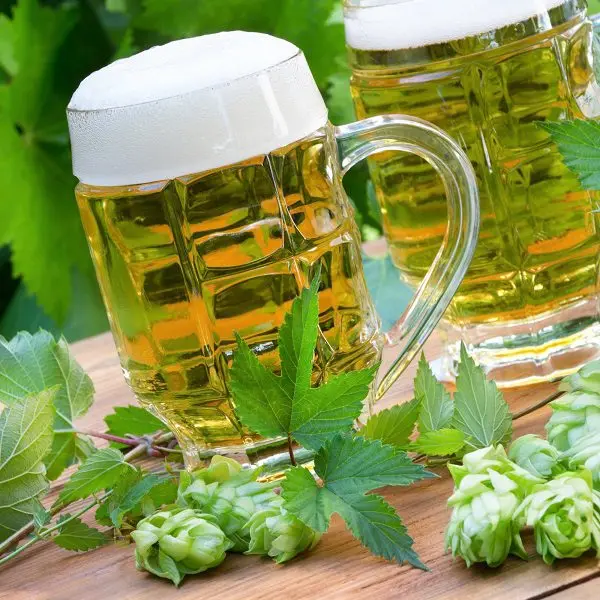Contents
Considering the red spots on the swollen face that appeared the next morning after friendly gatherings, some of us for the first time wonder if there is an allergy to beer. Unfortunately yes. Moreover, if earlier it was extremely rare, then every year more and more people complain about this disease.
Trying to make their product tastier and in an effort to extend the shelf life, manufacturers add more and more flavoring agents, flavor enhancers, and preservatives to beer. And no one can predict what reaction all these substances will cause in the human body.
Beer Allergy Symptoms
The exacerbation of allergies is not caused by the drink itself, but by one or more of its ingredients (organic and inorganic compounds):
- barley malt;
- hop;
- yeast;
- sulfites and other additives;
- carbon dioxide.
Sometimes an allergic reaction is caused by a combination of beer with some kind of snack.
Allergy to barley malt
Barley malt contains the LPT protein, a strong allergen. When ingested, it causes:
- rash, itching, tingling of the skin of the face;
- cough – due to inflammation of the mucous membrane. In difficult cases, pulmonary edema is possible;
- swelling of the eyelids and lips.
Often, people with pollen allergies react to barley malt protein. The same symptoms appear after eating barley porridge, less often pasta and other types of porridge.
A person with this form of allergy should try gluten-free rice and corn beer. Light wheat beer contains gluten, but if the allergy is mild, the drink may not cause a negative reaction in the body.
Hop allergy
Symptoms:
- allergic rhinitis, conjunctivitis. Obviously not a cold, a person begins to sneeze, blow his nose, tears flow from his eyes, eyelids swell;
- hives;
- asthma attack. In this case, hospitalization is required.
If you are allergic to hops, beer should not be consumed at all, even non-alcoholic.

Yeast Allergy
Symptoms:
- nausea and vomiting;
- diarrhea;
- pain in the upper abdomen;
- hives and itching;
- cough (due to mucosal inflammation).
If you are allergic to yeast, you should not drink live unfiltered beer.
Allergy to sulfites and other additives
Symptoms:
- rash;
- nausea, vomiting, diarrhea;
- in severe cases – anaphylactic shock.
Sulfites are commonly used as preservatives not only for beer, but also for wine. Therefore, wine allergy sufferers usually cannot drink canned beer. Live beer, in which there are no such amount of chemical additives, usually does not cause a negative reaction.
Allergy to carbon dioxide
In sensitive people, carbon dioxide causes swelling of the face, hands or feet. In the same way, the body reacts to carbonated water, artificially carbonated champagne, purchased kvass. If you are allergic to carbon dioxide, it is recommended either to completely abandon beer, or to determine a relatively safe dose experimentally (live beer is preferable, since it has natural carbonation).
Allergy to beer in babies
Sometimes breastfeeding women cannot refuse beer or deliberately drink a little of it so that milk comes. It must be remembered that hops are the strongest allergen that can cause a rash and stomach cramps in an infant. Therefore, it is better not to drink beer during lactation.
Prevention and Treatment of Beer Allergy Symptoms
If the symptoms of beer allergy appear in an adult who has previously consumed the drink without problems, it means either he has a weakened immune system, or it is “lucky” to find a beer with a high allergen content.
Another option is an allergy to the combination of beer with some kind of product. Most often, the exacerbation of the disease is caused by “chemical” snacks: chips, crackers and nuts with flavors.
If the symptoms do not require hospitalization, then it is necessary:
- refuse to drink beer until the causes of the allergic reaction are clarified;
- for rashes and swelling for 1-2 days, fasting, drinking 2-2,5 liters of liquid daily;
- for the rash to pass quickly, you need to drink nettle infusion 3-4 times a day (it cleans the blood);
- with swelling, drink rosehip infusion;
- take antihistamines as directed by your doctor.
Then you should consult an allergist. After the tests, it will become clear what exactly causes the allergy. Then it will be possible to determine which types of beer should not be consumed categorically, and which ones should not be discarded.
Attention! Self-medication can be dangerous, consult your doctor.









